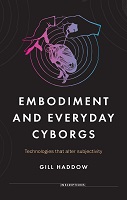Embodiment and everyday cyborgs
Technologies that alter subjectivity
Author(s)
Haddow, Gill
Collection
WellcomeLanguage
EnglishAbstract
"Using a range of social science methods and drawing on the sociology of the body, biomedicine and technology, Haddow invites readers of ‘Embodiment and everyday cyborgs’ to consider whether they might prefer organs from other humans or non-human animals (known as xenotransplantation), or implantable ‘cybernetic’ technologies to replace their own? In discovering that individuals have a very clear preference for human organs but not for the non-human, Haddow suggests that the inside of our bodies may be more important to our sense of identity than may have previously been thought.
Whereas organs from other (once) living bodies can contaminate the body of the recipient (simultaneously altering subjectivity so they inherit traits e.g. gender), cybernetic technology is acclimatised to and becomes part of the body and subjectivity. In organ transplantation the organ has the potential to alter subjectivity – whereas with cybernetic technology it does not alter identity but is incorporated into existing subjectivity.
Technologies are clean from previous organic fleshy associations and although they may malfunction or cause infection, they do not alter identity in the way that an organ might. Yet, we are arguably creating a 21st-century identity crisis through an increasing reliance on cybernetic technologies such as implantable cardiac defibrillators (ICDs) creating new forms of ‘un-health’ and a new category of patient called ‘everyday cyborgs’ who have to develop strategies to incorporate device alienation as well as reinserting human agency over ICD activation. "
Keywords
Cyborgs; xenotransplantation; body modification; phenomenology; cartesian dualism; sociology of the body; biomedicine; cybernetic system; identity; organ transplantationISBN
9781526114198Publisher
Manchester University PressPublisher website
https://manchesteruniversitypress.co.uk/Publication date and place
Manchester, 2021Grantor
Series
Inscriptions,Classification
Artificial intelligence
Impact of science and technology on society


 Download
Download Web Shop
Web Shop